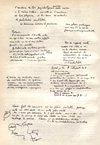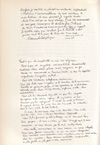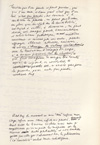on the example set by paul valéry
Other people make books. I am making my mind.
So wrote Paul Valéry in the early part of the last century. For fifty-one years, he would arise at five o’clock every morning to devote two hours to his contemplations, undisturbed by the outside world. The picture that comes to mind is of the writer at his desk, the darkness at the windows of his Parisian abode gradually dissolving into dawn.
If as he remarked daytime lights up my ideas and my ideas light up my nighttime, then these in-between hours must have had him observing both of these operations attentively as one form of illumination gave way to the other.
Like a monk, Valéry was perfect in the constancy of his meditations — though since his was an atheistic introspection, we should add a secular cigarette, coffee cup, and fountain pen to our portrait of this thinker. And while his likeness should age as we watch him, his objects of inquiry should not, for they remained the few core puzzles of consciousness on which he’d been steadily training his attention since his earliest maturity.
In any case such questions are timeless.
Towards the end of his life, he wryly likened himself to a cow attached to a post, grazing on the same questions in the meadow of my mind. His note-taking was a kind of perpetual preparation, without purpose, without end — perhaps as instinctive as an ant’s…
But such modesty was uncharacteristic. More often Valéry took a haughty pride in this never-ending lifework of his, preferring it to the poems and essays that won him such acclaim both early and late in life. What he regarded as his real work — the Cahiers — refused to resolve itself neatly into any kind of comfortable closure. The almost impossibly high standard he upheld for writing and for thinking could only be approached, but never attained; such approaches were stabs at the truth, inscribed on the page in quick entries.
Valéry scorned lesser forms of literature as being too easy — novels, especially. Reading them, he said, _helps to kill second- or third-class time. ¶ First class time does not need killing. _
the notebooks
Certainly first class time is what’s called for if you’re to try wrapping your mind around the far reaches of Valéry’s meditations. They pose a fantastic challenge not only for their profundity but also their abundance: the facsimile edition of his notebooks, published posthumously, runs to 29 large volumes.
These are less like personal journals than laboratory logbooks, in which Valéry meticulously recorded the results of his inward experiments. It is up to us, his readers, to replicate his findings — that is, to try them out on ourselves, treating our “I” as as an experimental subject inside the laboratory of our own consciousness.
Valéry makes this possible for us because he’s not pondering the specifics of personality and characteristics the way that novelists and diarists do. His interest in states of mind is
only in what is not yet personal in those states, since their contents, the person, seem to me subordinate to those conditions (1) of impersonal consciousness and (2) of mechanics and statistics.
By this way of thinking, personality just isn’t as important as we tend to think it is. Best to regard it as a kind of room we happen to inhabit:
Certainly I cannot help having opinions, habits, a name, affections and aversions, a worldview of my own, just as the walls of my room are bound to have some color or other. But relative to all that I am, I am only what light is to that color; it could illuminate anything whatsoever.
body of thought
When you start observing your mind, what first happens is that you become more conscious of your body — after a while, exquisitely so. All kinds of subtle and fleeting sensations surface, and these too of course are thoughts that you can choose to trace. Often they will take you off in unexpected tangents, sometimes letting you alight on an unusual perch from which to peer inward and outward.
A possibly eccentric way to judge the profundity of various thinker’s accounts of mind is by examining their insights into the body. If so, then by this standard Valéry ranks very high, as you can see in this little note:
Just as the mouth is strangely sensitive and contains a medley of strong pressures, contending strains, obstructions and hard bodies interposed; of indefinable presences; of tastes and savors, moist contacts and a general slipperiness—so is the overall sensation produced by the body and the shifts of attention taking place within it like the movements of the tongue feeling and fumbling within its cavern…
Such unexpected sensitivity to the body — on the part of a thinker descended from Descartes — leads to many of Valéry’s best entries; a wonderful little volume could be made from his notes on pain.
In probing pain, he found, the mind encounters its powerlessness — one’s intelligence encompasses it, describes it, possesses it, and — can do nothing.
But perhaps it can. For a pain we could clearly conceive and almost circumscribe would become a sensation without pain. As such, he thought, you could attend to it in almost the same way as you listen to music: certain pains are grave and acute, some andante and furioso, held notes, organ stops, arpeggios, progressions, sudden silences, etc.
This observation is not merely clever but true, as you can see for yourself the next time you’re not feeling well and can trace your pain not unthinkingly but rather with an attitude approaching connoisseurship.
Who’d have thought that Valéry had so much in common with Artaud — and Michaux?
For illness does have its uses. It reminds us that health is a kind of ignorance or self-deception — that simplicity, immediacy, naturalness are merely the effects of insensibility, or of a mercifully limited range of feelings.
Beneath the simplicity of our illusive body image, our self-conception no longer holds:
>
> Man is man only on his surface.
> Lift off the skin, dissect; here the machinery begins. And soon you lose your bearings in an inexplicable substance, foreign to all you know and yet the basic stuff of the man you are dissecting.
> It’s the same thing with your desires, your feelings, and your thought. The familiarity and the human aspects of these things vanish on examination. And when, after lifting off the skin of language, I try to look beneath it, what I see bewilders me.
This notion of dissection, of putting your mind on the anatomy table, also invites the use of different lens settings: > >If you set your microscope to the first magnifying‑power, you get “Man is free.” If you step it up to the second, you get “Man is not free” — and then, maybe, it’s no longer Man that you are seeing.
narcissus
If so many of Valéry’s entries try reaching beyond the mundane facts & circumstances of the individual self, there is still a slight sense of preening to be found even in his private journals.
May I risk an ill-founded generalization about French writers? It is this: that they seem always to have one eye on the mirror, the better to judge the figure they are cutting. In Valéry’s case, at least he always had his other eye trained on truth and on clarity, things that later generations of French intellectuals seemed ever more willing to sacrifice in favor of cleverness, novelty, and fashion.
Valéry sometimes exulted in the glory of his literary isolation; he never joined any of the -isms that dominated French intellectual life, though when elected he was an energetic member of the Academie Francaise. Still, he prided himself on his inward dedication to the more rigorous, demanding, and unpublicized pursuits of his early-morning contemplations, when he was far removed from the herd.
His pride held steady even as he kept negating the value of the personal “I”, which he said was as non-existent and as necessary as the center of gravity of a ring — or as arbitrary as the point of origin in geometric space.
But about the vanity of mirror-gazing, we can give Valéry the last and best word: The Narcissus — thought finds a man in the mirror.
no perfection
But we’re still not done with Valéry, who in 1935 noted in his journal that having got up before five o’clock — it seems to me, at 8, that I’ve already lived through an entire day in my mind, and earned the right to be stupid until evening.
I might have dismissed this remark as false modesty had I not — two years ago, holed up in a wretched hotel in Austria, not far from the Gusen concentration camp — happened upon a footnote in Hannah Arendt’s Origins of Totalitarianism. There I was dismayed to discover that my hero Valéry had contributed money to the anti-Dreyfus cause earlier in the century — not, as Arendt pointedly quotes him as having declared, without reflection.
So much for the value of reflection, so called, when it yields so easily to bigotry. But it’s too often the case that the smartest of fellows show the most deplorable of judgments.
More recently I came upon Valéry’s public praise of Marshall Pétain, the general whose design for the Maginot Line would give the Nazis their perfect outflanking blitzkrieg and who would later, as the head of Vichy France, become their chief collaborationist.
To be fair, at the time of the address, all of this was several years in the future, and Pétain was still a hero from the first world war. What one finds in Valéry’s praise is actually nothing more than willful hyperbole, a mind getting carried away by its ideals (the Military Man of Action), paying little or no attention to actuality. The tone is an embarrassment:
But you, sir, fortified by that great, that almost legendary calm which attests its confidence in what will endure sustained by that watchful common sense which distinguishes you, by the prudence and foresight which have made you the Sage of the Army, you who keep, as a frontier to your thoughts, a silence which we feel to be fortified with facts, solidly organized in depth, you at least are that rare man whom the severest critics, the harshest controversialists, the very ones who ceaselessly practice the role of belittling the famous, and whose chosen vocation is to damage any greatness impressed on the public mind, have been obliged more or less to spare.
A piece of puffery, as can be seen from the air-blown rhetoric that piles clause upon clause over the underlying emptiness. Valéry’s son later recalled that whenever his father came upon a military parade, he would fall into step with the marching soldiers, which was no doubt the kind of thing that had happened to him here.
modeling mind
But Valéry’s flaws are the the flip-side of his virtues; neither would exist without the other.
Valéry’s approach — clear from the start in his precocious Introduction to the method of Leonardo, which he wrote in his early twenties, and also in his masterpiece M. Teste, which came to him a little later — was always to exalt his subject, to make it into an ideal model of mind. This allowed him to dispense with personality, with individuality, with the usual stuff of biographical profile, both for his own life and for others’.
And if this determination to generalize (or rather: to universalize) his subjects always ran the risk, when applied to the messiness of actual life, of discarding a few too many vital facts, well then, so be it. The opposite failing is so much more often the case in writing that Valéry remains a crucial counter-balance.
So let us read him the way he read others. He confessed the value of his reading was not so much that of the works themselves as of the idea of their authors which those works impressed on me. His interest was in
the work that incites me to picture the living and thinking system that produced it—an illusion, no doubt, but one that develops energies not to be found in the attitude of a purely passive reader.


